Ibrahim K. Sundiata is an American scholar of West African and African-American history. He received his undergraduate education at Ohio Wesleyan University (B.A., 1966), and a Ph.D. (1972) at Northwestern University, where he studied under Ivor Wilks. He is currently the Samuel J. and Augusta Spector Professor of History and African and African-American Studies at Brandeis University.
Previously, Sundiata served as the chairman of the history department of Howard University, and taught at Rutgers University, Northwestern University, the University of Illinois at Chicago, and the Universidade Federal da Bahia. He has received grants from the Ford Foundation, Woodrow Wilson Center, and Fulbright Program, and was a fellow at the W.E.B. DuBois Institute at Harvard University. He is also a member of the Council on Foreign Relations.
Sundiata's research has focused on Atlantic slavery, migration and colonialism and its legacies in Equatorial Guinea and Liberia, and, more recently, on race relations in the United States and Latin America, particularly in Brazil.

Equatorial Guinea, officially the Republic of Equatorial Guinea, is a country on the west coast of Central Africa, with an area of 28,000 square kilometres (11,000 sq mi). Formerly the colony of Spanish Guinea, its post-independence name evokes its location near both the Equator and the Gulf of Guinea. As of 2015, the country had a population of 1,225,367.

The History of Equatorial Guinea is marked by centuries of colonial domination by the Portuguese, British and Spanish colonial empires, and by the local kingdoms.

Malabo is the capital of Equatorial Guinea and the province of Bioko Norte. It is located on the north coast of the island of Bioko,. In 2018, the city had a population of approximately 297,000 inhabitants.
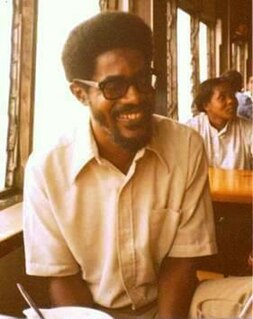
Walter Anthony Rodney was a prominent Guyanese historian, political activist and academic. He was assassinated in 1980.
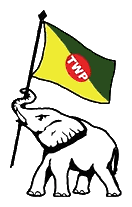
The True Whig Party (TWP), also known as the Liberian Whig Party (LWP), is the oldest political party in Liberia and one of the oldest parties in Africa and the world. Founded in 1869 by primarily darker-skinned Americo-Liberians in rural areas, its historic rival was the Republican Party. Following the decline of the latter, it dominated Liberian politics from 1878 until 1980. The nation was virtually governed as a one-party state under the TWP, although opposition parties were never outlawed.

The Bight of Biafra is a bight off the West African coast, in the easternmost part of the Gulf of Guinea.

The Bubi people are a Bantu ethnic group of Central Africa who are indigenous to Bioko Island, Equatorial Guinea. Once the majority group in the region, the population experienced a sharp decline due to war and disease during Portuguese expeditions. By the end of Spanish colonial rule in the mid 20th century, and after substantial intermarriage with newly introduced populations, such as Afro-Cubans, Krio people, Portuguese people and Spaniards, the Bubi people, again, experienced a great decline in number. Seventy-five percent perished due to tribal/clan rooted political genocide during a civil war that led to Spanish Guinea's independence from Spain. This, too, sparked mass exodus from their homeland with most of the exiles and refugees immigrating into Spain. The indigenous Bubi of Bioko Island have since co-existed with non-indigenous Krio Fernandinos; and members of the Fang ethnic group, who have immigrated in large numbers from Río Muni. Once numbering approximately 3 million, the Bubi currently number around 100,000 worldwide.

Spanish Guinea was a set of insular and continental territories controlled by Spain from 1778 in the Gulf of Guinea and on the Bight of Bonny, in Central Africa. It gained independence in 1968 and is known as Equatorial Guinea.

Freedom's Journal was the first African-American owned and operated newspaper published in the United States. Founded by Rev. John Wilk and other free black men in New York City, it was published weekly starting with the 16 March 1827 issue. Freedom's Journal was superseded in 1829 by The Rights of All, published between 1829 and 1830 by Samuel Cornish, the former senior editor of the Journal. The View covered it as part of Black History Month in 2021.
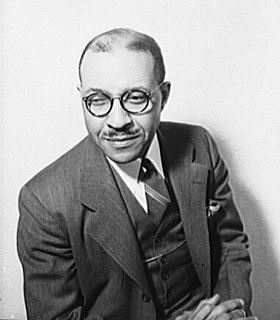
Charles Spurgeon Johnson was an American sociologist and college administrator, the first black president of historically black Fisk University, and a lifelong advocate for racial equality and the advancement of civil rights for African Americans and all ethnic minorities. He preferred to work collaboratively with liberal white groups in the South, quietly as a "sideline activist," to get practical results.
Fernandinos are creoles, multi-ethnic or multi-racial populations who developed in Equatorial Guinea. Their name is derived from the island of Fernando Pó, where many worked. This island was named for the Portuguese explorer Fernão do Pó, credited with discovering the region.
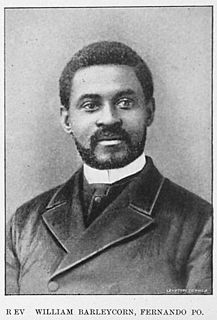
William Napoleon Barleycorn (1848–1925), born in Santa Isabel, Fernando Po, Spanish Guinea and a Krio Fernandino of Igbo descent, was a Primitive Methodist missionary who went to Fernando Po in Africa in the early 1880s. From there, he traveled to Edinburgh University.
Edward Emilio Barleycorn (1891–1978) was a member of one of the prominent Fernandino families of Spanish Guinea. In 1928, at the age of 39, he negotiated a labor contract between African farmers of Santa Isabel and the Spanish leaders of Fernando Po (Bioko).

William Allen Vivour was the single most successful 19th-century planter in Africa due to his substantial and flourishing cocoa plantation in Fernando Po. He was the son of a recaptive of Yoruba ancestry captured from what is now present day Lagos Nigeria, and resettled in Sierra Leone by the British West Africa Squadron, and eventually settled in present day Equatorial Guinea and Nigeria.

General elections were held in Liberia in 1927. In the presidential election, the result was a victory for Charles D. B. King of the True Whig Party, who was re-elected for a third term after defeating Thomas J. Faulkner of the People's Party.
The Mven is a river of southwestern mainland Equatorial Guinea. It forms part of the Muni Estuary along with the Mitong River, Mandyani River, Mitimele River, Utamboni River and Congue River.

Cuthbert Christy was an English doctor and zoologist who undertook extensive explorations of Central Africa during the first part of the 20th century. He was known for his work on sleeping sickness, and for the Christy Report on practices very similar to slavery in Liberia in the 1920s.
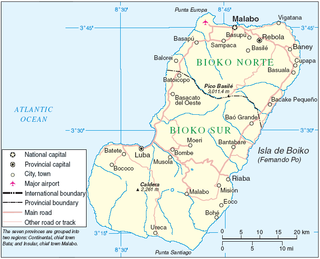
Bioko is an island 32 km (20 mi) off the west coast of Africa and the northernmost part of Equatorial Guinea. Its population was 335,048 at the 2015 census and it covers an area of 2,017 km2 (779 sq mi). The island is located off the Ambazonian segment of Cameroon, in the Bight of Bonny portion of the Gulf of Guinea. Its geology is volcanic; its highest peak is Pico Basile at 3,012 m (9,882 ft).
David Aworawo is a Nigerian Professor of International Relations and Strategic Studies, and the Head of the Department of History and Strategic Studies, University of Lagos, Nigeria. He specializes in strategic studies, international relations, political history and development studies. He has published widely in the areas of African politics and international relations.

The Howard School of International Relations is a school of academic thought originating at Howard University in the decades between the 1920s and 1950s. Articulated by scholars such as Merze Tate, Ralph Bunche, Alain Locke, E. Franklin Frazier, Rayford Logan, and Eric Williams, the Howard School emphasized race and empire in the study of international relations. These scholars posed a sustained critique of dominant international relations theories such as racial hierarchy, which vindicated the Jim Crow era in the U.S as well as the practice of colonialism in the world through the 1960s.